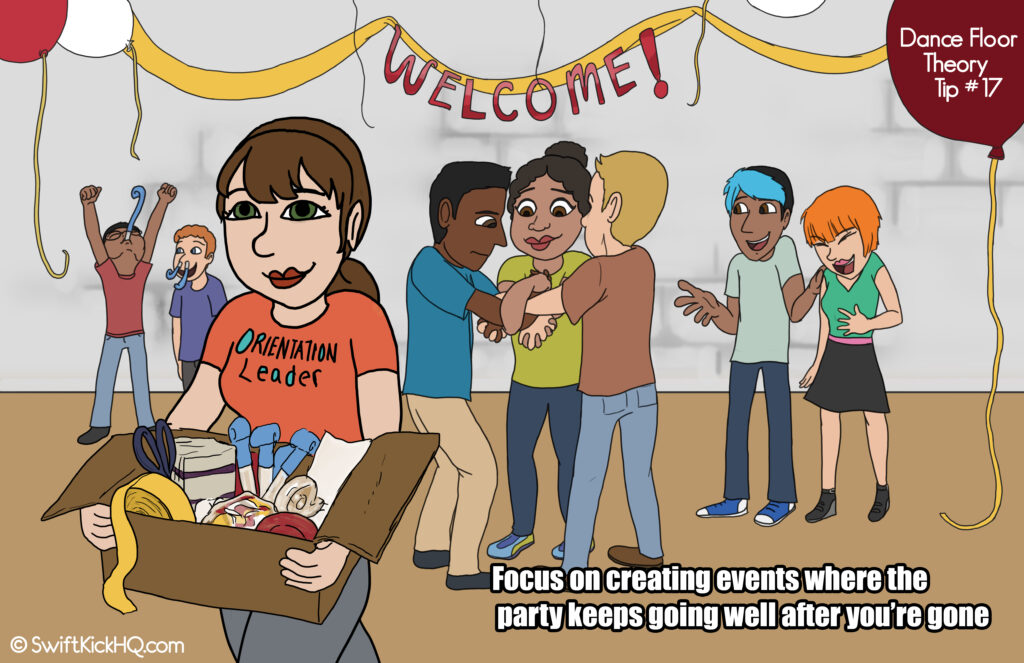Unless you’re in second grade, you probably don’t know this, but today, March 11, is Johnny Appleseed Day! Yes, I was seven the last time I talked about him. But I did some research for this post, and I realized that he is a great example of the following Dance Floor Theory tip:

The (Apple) Party Keeps Going
Johnny Appleseed (aka John Chapman) became a legend even before he died. Famous for
But you can’t just plant some trees and walk away. Instead, he would plant these nurseries on someone else’s property (with their permission, presumably) and then entrust them to care for the trees. He would check on them every few years.
His story reminds us that if a leader does everything themselves, they have to choose between staying put forever, or leaving a mess behind them when they leave. Appleseed knew that planting trees wouldn’t do any good if there was nobody to look after them. But he also knew that if he didn’t move on, he wouldn’t be able to make a big impact across the continent. Leaders know that it’s their job to involve others in the process to truly succeed.

Leaders Leave
In any organization, company, or club, there are people who have a full grasp on all the moving pieces. These are the leaders who know the ins and outs of what they do – the inner workings of the machine. Being human, however, they might get sick for a long time, go on maternity leave, or find a better position somewhere else. What happens when they walk away?
A person who cares about the organization or project, will leave well-trained and informed people behind. There is a system in place that someone else can take over easily. They have forged alliances between others, been transparent with information and how-tos, and instilled a sense of ownership in those previously working under them. They have already spotted the “trending leaders” who will take their place.
A person who doesn’t care at all will just walk away, leaving all their work to be undone. Wanna hear a scary stat about those people? In a study done by careerbuilder.com, “58% of managers said they didn’t receive any management training.” Talk about leaving your people high and dry!
How To Plant Your Own Trees
“Leadership is about making others better as a result of your presence and making sure that impact lasts in your absence.”
— Sheryl Sanberg, COO of Facebook
Johnny Appleseed planted seeds both literally and metaphorically. When he moved on, he left both trees and new leaders who could care for them. You can do the same in your role.
Look for “trending leaders”
A trending leader is anyone, new recruit or not, who has leadership potential. They may not have the skills yet, but you see they have the makings of a leader. These are the people you should encourage to take on more responsibility. Mentor them, as they may be the perfect replacement, should you leave. Sadly, this doesn’t seem to be happening very often: “63% of millennials feel their leadership skills are not being fully developed by their employers.”
Be transparent
Is every member of your team getting together to share what they have been working on? Or are you living in silos, completely isolated from each others’ projects? Sharing instructions and updates is a great way to help someone find the information they need, should you not be there.
Create systems
The best systems are plug-and-play. Create work flows and use tools that make it easy for everyone to jump in.
Trust them
Sometimes, well-meaning leaders and go-getters forget to delegate and refuse to give up full control. This limits the leader! At the end of the day, if you’ve involved other people, you have to trust them to do their job. They will succeed, even not in EXACTLY your way, if you’ve picked the right people.
If you’ve followed these steps, and an opportunity or personal situation comes along, you won’t feel guilty leaving. Instead, you and those you work with will feel confident that they can keep the party going, long after you’re gone.